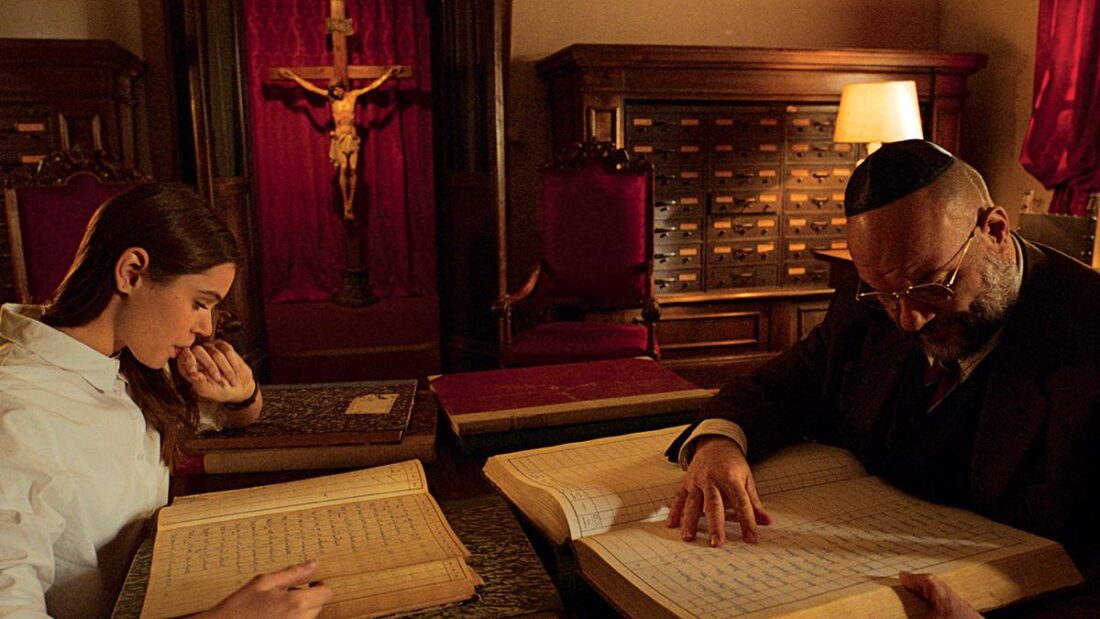Fascist Italy’s persecution of its Jewish citizens is hardly a new theme in Italian cinema. Vittorio De Sica’s The Garden of the Finzi Continis (1970) and Roberto Benigni’s Life is Beautiful (1998) were both commercial and critical hits, winning the Academy Award in the best foreign film category.
Giulio Base’s A Starry Sky Above The Roman Ghetto is the latest Italian-language movie to examine this topic. It will be screened by the Hannukah Film Festival, to be presented online by Menemsha Films from November 28 to December 5.
Partially based on real events, and oscillating between the past and present, Base’s film starts with an explosive incident in Rome known as Black Saturday. On October 16, 1943, 1,259 Italian Jews, including 200 children, were rounded up by the Germans and their Italian collaborators and dispatched by train to a Nazi extermination camp in Poland.
Miraculously, a Jewish girl named Sara Cohen, a figment of Base’s imagination, survived the onslaught, having been rescued by a nun in a convent.
This scene abruptly dissolves as we’re transported to the present day, during which an Italian mother and her daughter, Sofia (Bianca Panconi), clash in an argument.
Flashing back to wartime Rome again, an enraged man slaps his unmarried daughter upon learning that she is pregnant and that her boyfriend is Jewish.
Returning to the present, the film pans on Sophia, an aspiring violinist, and her friend, Valentina (Emma Matil Lio) as they chat in Sofia’s room. By chance, Sophia finds two objects in an old suitcase she purchased in a pawn shop. A yellowed letter refers in highly emotional terms to Sara Cohen. A faded photograph depicts Cohen.
Irresistibly drawn to this mysterious Jewish girl, Sophia goes to a synagogue to inquire about her. Several sassy young Jewish men standing guard at the entrance refuse to let her in, citing the sabbath, and suggest she return tomorrow.
Beset by curiosity, Sophia yearns to know what happened to Sara. As she subsequently learns, Sara was born in 1929 and her parents were deported to Poland, where they were murdered in a Nazi concentration camp.
Sophia, along with several of the Jewish men she met at the shul, form an informal group to find the answer to this burning question. As their commitment to this project swells, they decide to stage a play about Sara. This interests Sophia’s grandmother (Aurora Cancian), with whom Sophia has a great deal of rapport. In the meantime, Sophia discovers that Sara was adopted, never to be seen again by the nuns.
As the suspense thickens, Sophia learns that Lucia, an ailing 90-year-old nun, was the young woman impregnated by her Jewish boyfriend, Vittoria, and that Lucia saved Sara from the clutches of the fascists.
These coincidences seem to be overwrought, perhaps artificial, but they work from a dramatic perspective. The film is never less than persuasive, and the cast is excellent. Panconi, in particular, stands out. She is an extraordinarily beautiful actress whose acting skills are beyond reproach.

In an unexpected twist, Sophia and Ruben (Daniele Rampello), one of the Jewish men she encountered at the synagogue, fall into each other’s arms. Ruben dashes Sophia’s romantic idyll when he regrettably says he cannot seriously date a Christian.
As Sophia comes tantalizingly closer to establishing the truth about Sara, an amazing series of details from the past emerge. Some viewers may dismiss them as corny. Still others will be swept along by the mounting drama.
Whatever you may think, A Starry Sky Above The Roman Ghetto hits all the right buttons and envelops you in its warm embrace.
For further information on the festival: https://www.menemshafilms.com/hanukkahff2021
